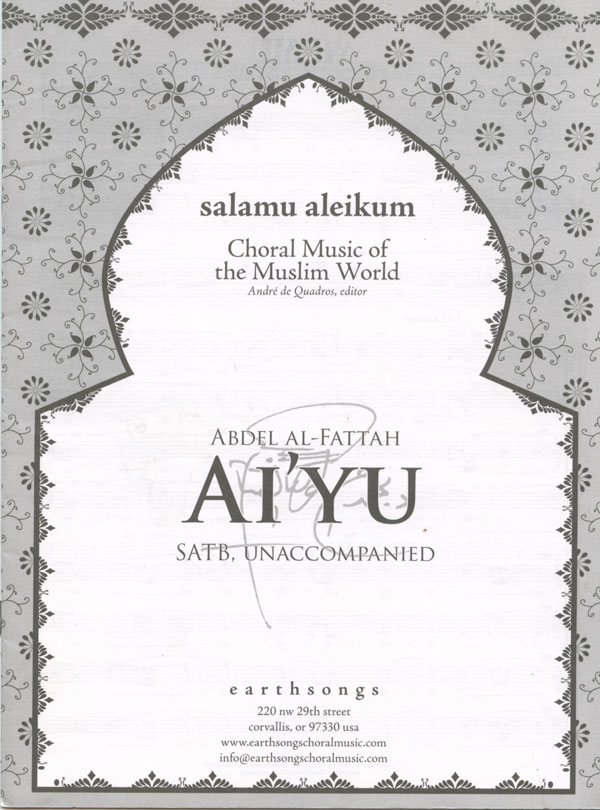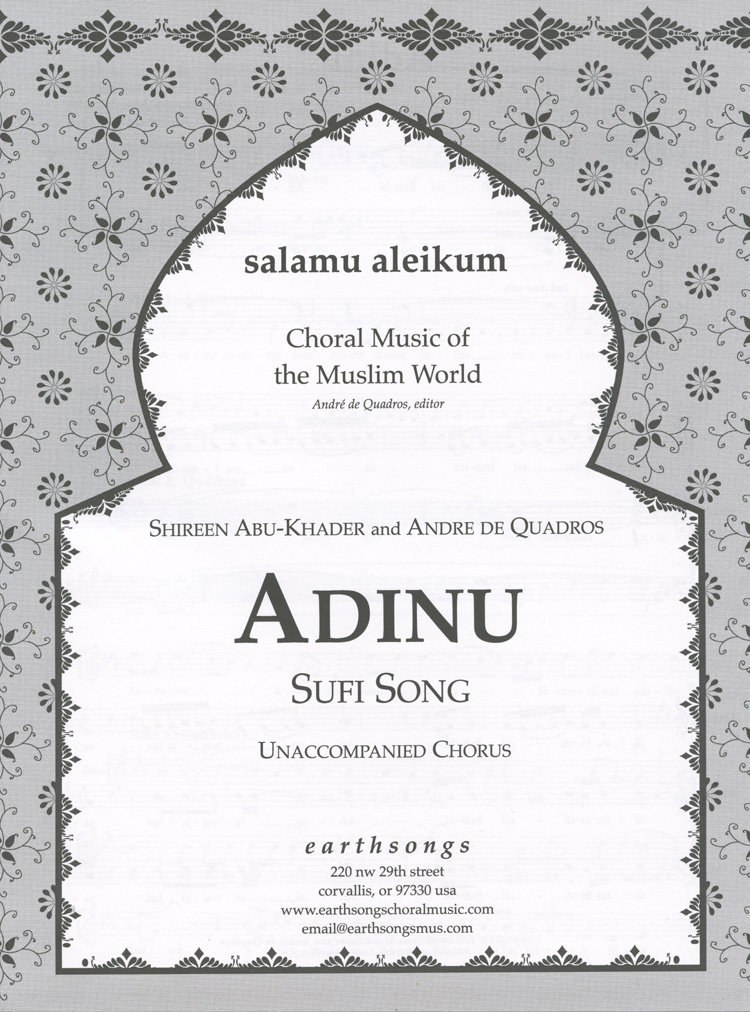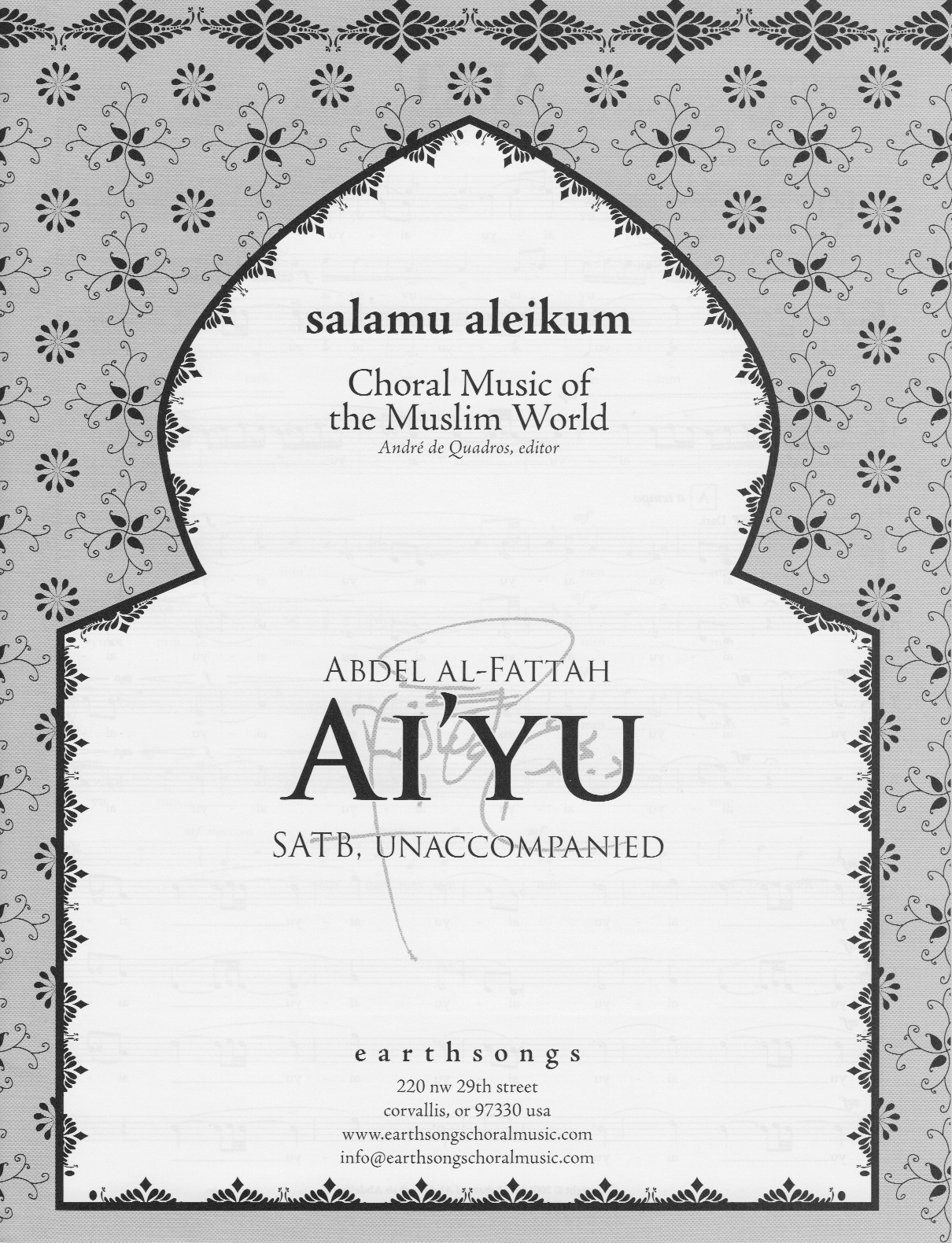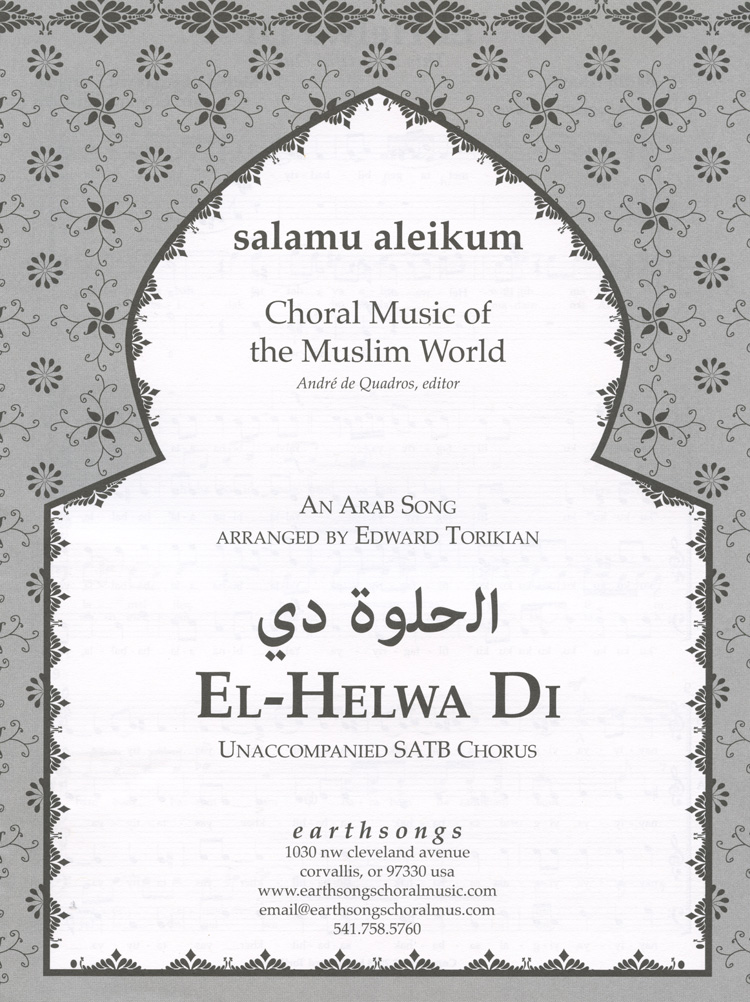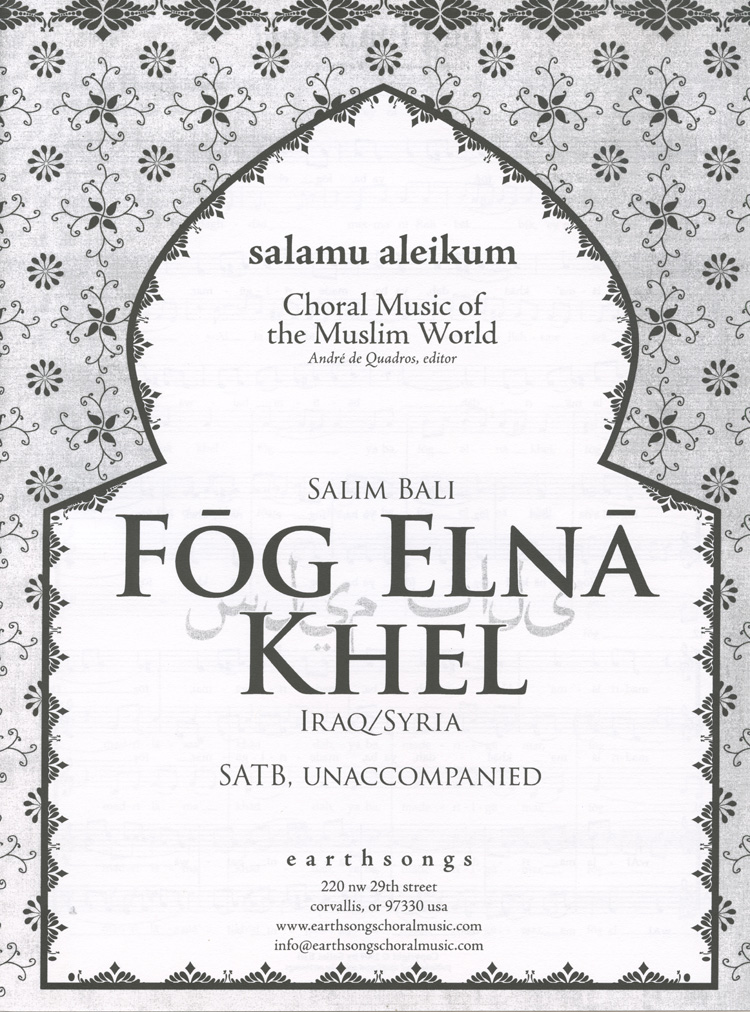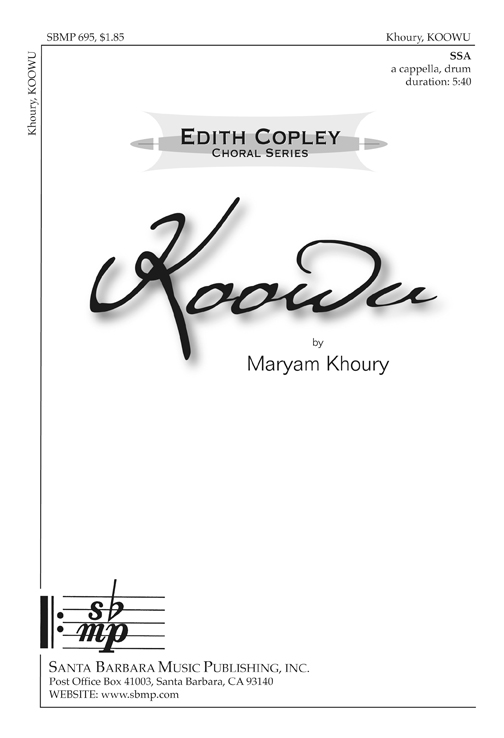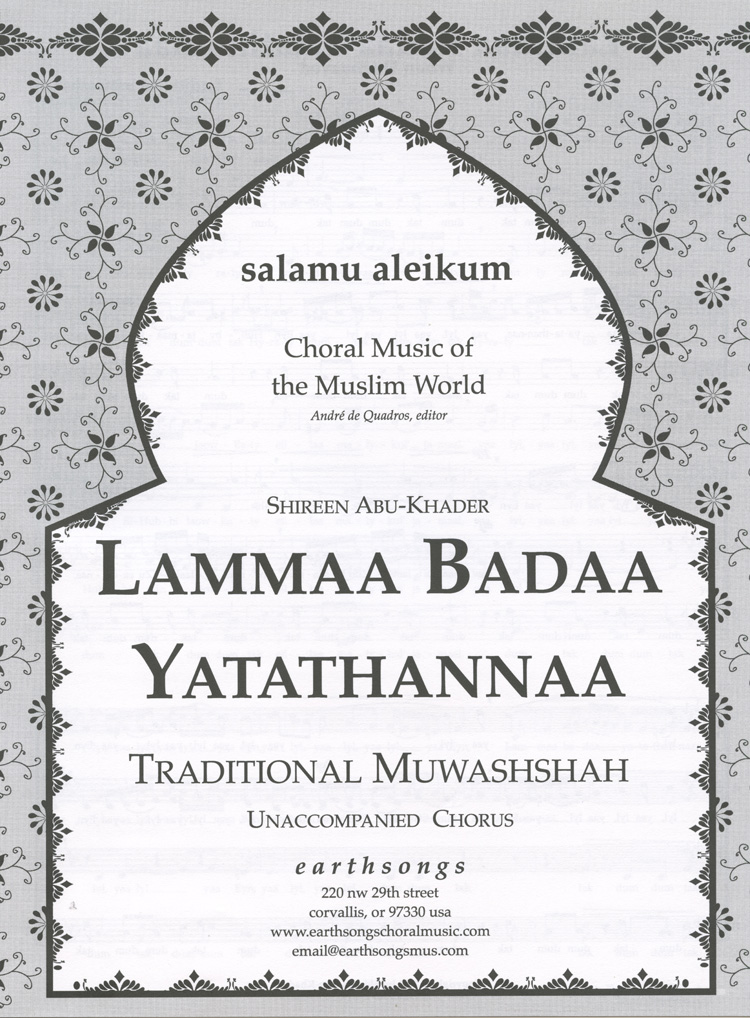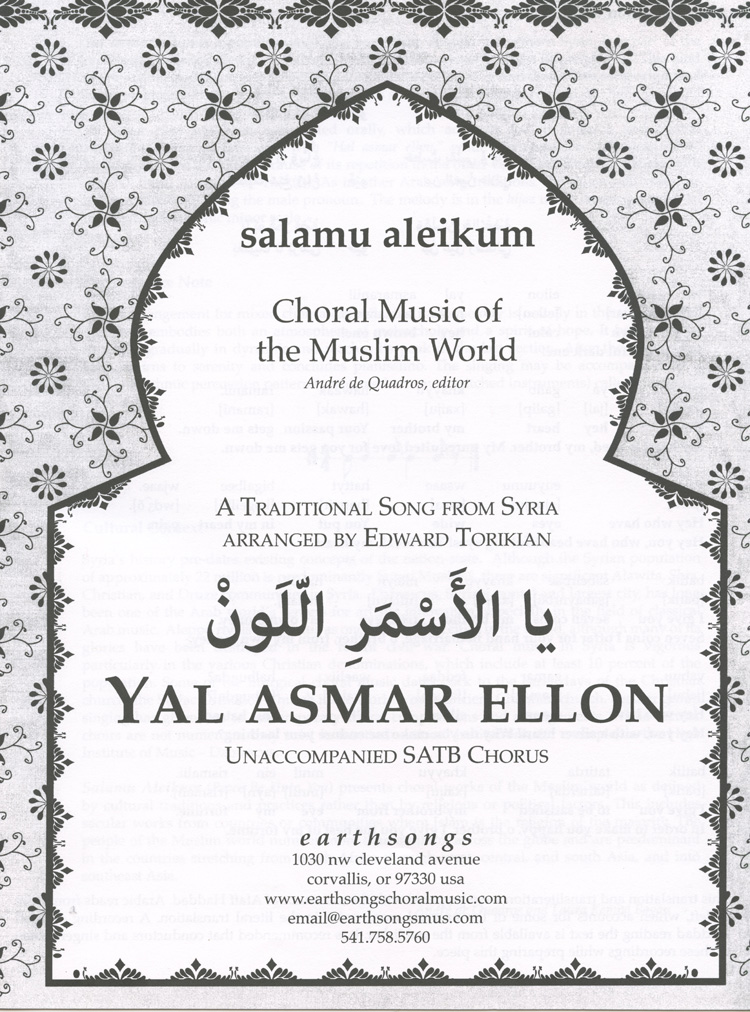In Celebration of the Human Voice - The Essential Musical Instrument
Home | Doo Wop | Barbershop | World | Contemporary | Christian | Vocal Jazz | Choral | Christmas | Instructional | Arrangements
Classical | Opera | Musicals | Personality | Young Singers | Disney | Videos | Songs | The Artists

Choral Arrangements from Arab
| Traditional and modern Arabic choral and folksongs arranged for harmony voices. |
Displaying 1-9 of 9 items.
Arranged by Andre de Quadros and Shireen Abu-Khader, the text of this traditional Sufi melody is attributed to the Andalusian Moorish Sufi mystic, philosopher, and poet, Abu Abdillah Muhammad (1165-1240). He believed that love was the dominant universal force. He is, even today, a powerful symbol of inter-religious harmony.
Arranger: Andre de Quadros | Country: Arab
The word ai'yu (transliterated here from Arabic) is a term used by the people of Alexandria, Egypt. A distinctly secular term, ai'yu can take on a number of meanings but is used as a common exclamation of awe, excitement, and wonder. In this composition, Abdelwahab has taken his native knowledge of traditional Egyptian melody and ornamentation as the basis for new composition.
Composer: Mohamed Abdelfatah | Country: Arab
It isn't very often that you get a chance to perform music from the Middle East! This setting of an Arabic folksong isn't difficult and the percussion patterns are easily performed by your singers.Available separately: 3-Part Mixed and 2-Part. ShowTrax CD also available. Performance Time: Approx. 2:00
Arranger: John Higgins | Country: Arab
The melody of the song El-Helwa Di was created by Eqyptian composer Sayyid Darwish, (1892- 1923) in Egyptian Arabic, to lyrics by Badih Khayri. Torikian arranged this song for mixed chorus, a cappella, combining harmonic and contrapuntal styles, and rhythms and effects from different traditions. This song represents Egyptian life at the beginning of the twentieth century. Early in the morning, a beautiful woman wakes up to prepare the bread of the day. In the meantime, the sound of the rooster is heard-"ku ku ku ku"-and the entire neighborhood awakens. People begin to greet to each other happily. Their pockets are empty of money, but their mood is calm and peaceful, convinced that hope and patience are good virtues in life, and that God is always present in the hearts of poor people.
Arranger: Edward Torikian | Country: Arab
Salim Bali heard the song Fo g Elna Khel for the first time in a Syrian Arab Television broadcast in 1966, when the great Iraqi singer Naa al-Ghazali was hosted in a special TV program in Damascus. Initially, and as is the case with most Syrians, the homonymous nature of its title phrase led Bali to think that the words were "Fog el-Na khel" ("High above the palm trees"), despite the fact that the remainder of the lyrics did not have much to do with palm trees. This belief persisted until 2006 when a musician friend informed him of the little known fact that it really is spelled Fo g Elno Khel ("There above, I have an intimate friend"), which, in the Iraqi accent, is pronounced the same.
Country: Arab
In Arabic, Koowu means strength. As a child, Maryam Sameer Faheem Khoury's father told her stories about the difficulties he experienced growing up in Palestine. Koowu is about how different her life would be if her father had not moved to the United States. The text of Koowu is symbolically about a caged bird who longs to fly away and find freedom. The modality of the melody hints at the composer's roots; the addition of a dumbek (drum) adds its own authenticity to the ethnic leanings of the piece. A colorful, unique addition to women's repertoire. Dumbek part available as a free download.
Composer: Maryam Khoury | Country: Arab
Here is a traditional Andalusian/Arabic song arranged for 2-part voices (any combination), piano, optional violin, cello and dumbek, or any combination of these instruments. Very well crafted, it includes notated ornaments to achieve a more authentic performance as well as educational information, pronunciation, translation and instrumental parts.
Arranger: Joy Ondra Hirokawa | Country: Arab
Shireen Abu-Khader's Lammaa badaa yatathannaa is a popular Arabic muwashshah. The muwashshah, a strophic form, originated in Cabra during the Muslim rule in Spain until 1492. Since then, this song type has spread throughout the Arab world where it survives in oral tradition.
Country: Arab
Yal asmar ellon is a popular traditional song from Aleppo in northern Syria. It is part of the repertoire of songs called al qudud. This song originated in the 19th century. Yal asmar ellon has been transmitted orally, which accounts for its melodic and textual variations. As in other Arab song traditions, the singer adresses his beloved discreetly using the male pronoun. The melody is in the hijaz mode, similar to the Western harmonic minor scale.
Country: Arab
Select a Category |
Want to Sing? - Find a Chorus Near You
List of Choruses by State | List of Choruses by City

